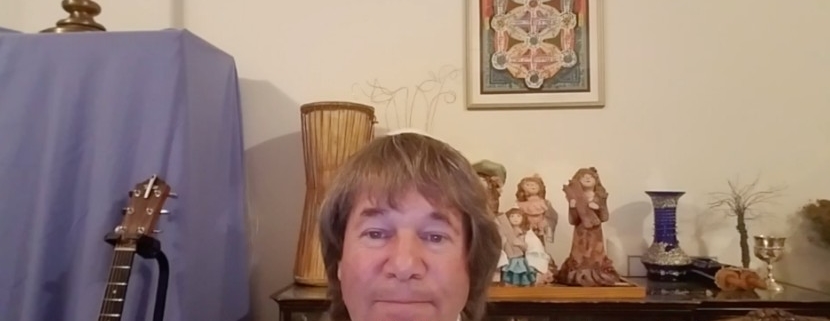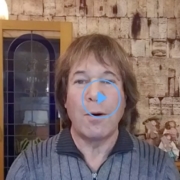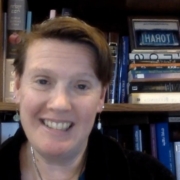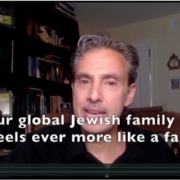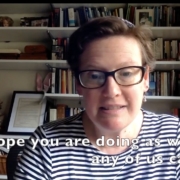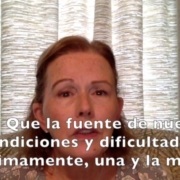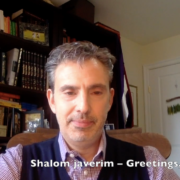Palabras del Torá / a “vort” of Torah from R’ Sunny Schnitzer
Palabras del Torá Agosto 2020 from Bayit: Building Jewish on Vimeo.
Each month Bayit offers regular video “vorts” (words of Torah / teachings from Jewish tradition) offered in or translated into Spanish, designed for Cuban Jewish communities and available to Spanish-speaking Jews everywhere. This month’s video offering features a teaching from Rabbi Sunny Schnitzer. The text follows the video, in Spanish and then in English.
Hola mis amigos
Primero, permítame enviarle nuestra admiración por el pueblo cubano que ha hecho lo que Estados Unidos no ha podido hacer: controlar la pandemia del coronavirus. Esto se debe a la disciplina y la dedicación de los cubanos entre sí, a la comunidad. Kol Hakavod.
Sé que estos son los momentos más difíciles en Cuba. La privación económica y la incertidumbre lo socava todo.
Parece que el centro se está derrumbando.
Los judíos sabemos mucho acerca de perder nuestro centro.
Acabamos de pasar por Tisha B’av, el día más negro del calendario hebreo tradicional. Lloramos la destrucción del centro de la vida judía, Jerusalén. Lloramos las cosas que hemos perdido.
En nuestro viaje al punto más bajo de la vida espiritual judía nos llevó a través de Shabat Hazon, el Shabat de la Visión.
Tristemente, la visión que recibimos en nuestra Haftarah, del Profeta Isaías, es una visión de destrucción, miseria y muerte.
“¿Qué golpe caerá después, a medida que se desate más y más violencia y corrupción en la tierra? Si la nación fuera un cuerpo, toda la cabeza estaría enferma y todo el corazón se desmayaría;
Desde la planta del pie, incluso hasta la cabeza, no hay solidez en él; pero heridas, contusiones y llagas supurantes: no han sido tratadas, ni vendadas ni calmadas con medicamentos.
Tu país está desolado; tus ciudades se queman con fuego; los extraños devoran tu tierra en tu presencia, y está desolada.”
Es inquietante escuchar estas palabras pronunciadas hace dos mil quinientos años y mirar a nuestro alrededor hoy.
Pero la visión de Isaías nos recuerda también que nuestra tarea es trabajar por la salud y la paz.
Ahora, después de Tisha B’av, nos reunimos no solo para llorar lo que fue, sino también para aprender de él: para preguntar cómo llegamos aquí y ¿qué haremos ahora con lo que sabemos?
Debido a que hemos sobrevivido a tantas destrucciones en nuestra historia, el pueblo judío sabe mejor que cualquier otro que la humanidad es una. Nosotros, el pueblo judío y nuestro Dios, somos uno. El eterno Ejad.
El coronavirus no conoce límites ni fronteras. Nos está sucediendo a todos.
No hay “ellos”, solo somos nosotros y ninguno de nosotros está solo en esta lucha.
No sabemos qué pasará después en nuestro viaje por el Valle de la Sombra de la Muerte del Coronavirus. No sabemos lo que hay del otro lado.
Pero sí sabemos esto.
Después de Tisha B’av estamos en una trayectoria ascendente a las alturas de la alegría. El momento en que somos más íntimos con HaShem, Rosh Hashaná y Iom Kipur. El viaje desde nuestro punto más bajo al más alto ocurre relativamente rápido, cuarenta nueve días desde abajo hacia arriba. Siete días por siete. Siete es el número de creación.
HaShem siempre está creando algo nuevo para nosotros. Tendremos fe en nuestra historia, fe en los demás y fe en que el cambio siempre llega.
Si bien el tiempo es diferente para los seres humanos que para Dios, y para nosotros, los mortales, puede parecer que el cambio es lento, para Dios, una vida humana no es más que un abrir y cerrar de ojos.
Que algún día miremos hacia atrás a este momento y descubramos que esta fue nuestra experiencia también.
Hola Mis Amigos.
First, let me send to you our admiration for the Cuban people who have done what the United States has been unable to do – to control the pandemic of Coronavirus. It is because of the discipline, and dedication of Cubans to each other, to community, that you have achieved this. Kol Hakavod.
I know that these are the most difficult of times in Cuba. The economic deprivation and uncertainty undermines everything.
It seems that the center is collapsing.
We Jews know much about losing our center.
We have just come through Tisha B’av, the blackest day on the traditional Hebrew calendar. We mourn the destruction of the center of Jewish life, Jerusalem. We mourn the things we have lost.
On our journey to the bottom of Jewish spiritual life took us through Shabbat Hazon, the Shabbat of Vision. Sadly, the vision we receive in our Haftarah, from the Prophet Isaiah, is a vision of destruction, misery, and death.
“What blow will fall next, as more and more violence and corruption is unleashed in the land? If the nation were a body, the whole head would be sick, and the whole heart faint;
From the sole of the foot even unto the head there is no soundness in it; but wounds, and bruises, and festering sores: they have not been treated, not bandaged nor soothed with medication.
Your country is desolate; your cities are burned with fire; strangers devour your land in your presence, and it is desolate.”
It is haunting to listen to these words spoken twenty five hundred years ago and look around us today.
But the vision of Isaiah reminds us also that our task is to work for health and peace.
Now, after Tisha B’av, we gather not only to mourn what was, but also to learn from it: to ask how did we get here, and what shall we do now with what we know?
Because we have survived so many destructions in our history, the Jewish people know better than any other that humanity is one. We the Jewish people and our God are one. The eternal Ejad.
Coronavirus knows no boundaries and no borders. It is happening to all of us.
There is no “them” there is only us and none of us is alone in this struggle.
We don’t know what happens next in our journey through the Valley of the Shadow of Death of Coronavirus. We do not know what is on the other side.
But we do know this.
After Tisha B’av we are on an upward trajectory to the heights of joy. The time when we are most intimate with HaShem, Rosh Hashanah and Yom Kippur. The journey from our lowest point to the highest happens relatively quickly, 49 nine days from the bottom to the top. Seven days times seven. Seven is the number of creation.
HaShem is always creating something new for us. We will have faith in our history, faith in each other, and faith that change always comes.
While time is different for human beings than it is for God, and it may seem to we mortals that change is slow, to God, a human lifetime is but the blink of an eye.
May we someday look back to this moment and find that this was our experience too.
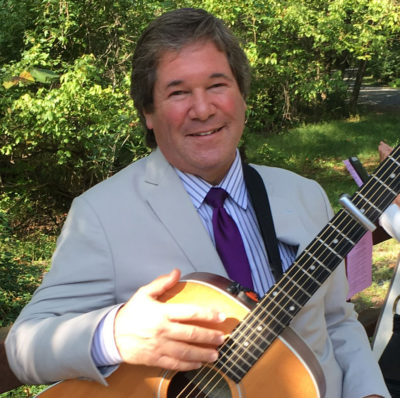
By Rabbi Sunny Schnitzer.

